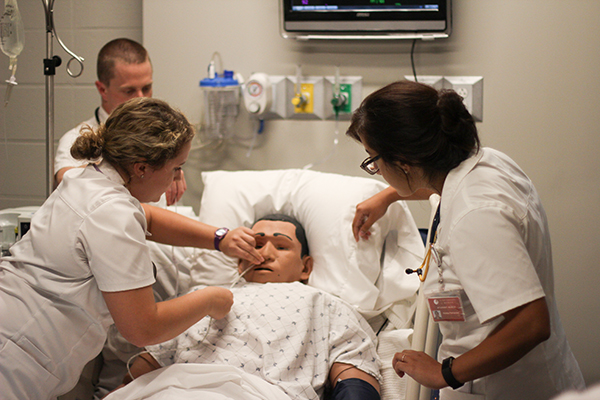University of Mobile’s (UM) Weaver Hall is home to some new residents and they are changing the way UM students prepare for health care careers.
The new residents are human patient simulators, realistic manikins that can be manipulated electronically to mimic everything from medical emergencies such as a heart attack to labor and delivery. Each manikin rests in a hospital bed surrounded by medical equipment. During a simulation students treat the symptoms presented, which are controlled by an instructor in a nearby room.
The experience is as close as students can get to treating a live patient, which students found out in a recent simulation.
‘What to do’
“For our simulation lab we had a situation where it was a pregnant mother and she was early, she had some high blood pressure, she was having a headache, so we were checking to see how far along the baby was,” said nursing student Jennifer Campbell, a junior from Robertsdale. “Then she coded so then you needed to do chest compressions and give her medication … just a very typical hospital scenario that we had to play out and figure out what to do and how to do it.”
‘Wow factor’
Giving students high quality, practical educational experiences is integral to the mission at UM, and its why UM invested in the high-tech “living laboratories,” said UM President Dr. Timothy Smith, who called the $4.6 million health care and science education center “the most advanced patient-care educational environment in the South.”
UM calls its approach to teaching college courses “Prac-ademics™,” which Smith describes as “the educational process of teaching theory or the academics in the classrooms, while providing practice environments to enhance the learning and retention of content taught in the classroom.”
Though the patient simulation labs definitely have a “wow factor,” the labs are all about preparing students to excel in their future health care careers, Smith said.
“Patients will be cared for with excellence and compassion in the days ahead because of the advanced level of academic preparation that was afforded to their caregiver here at University of Mobile,” Smith added.
Smith joined students, faculty members and guests for a ribbon-cutting ceremony Oct. 30 to reveal the new labs housed at Weaver Hall.
The 40,000-square-foot renovation, which takes up two floors, encompasses the College of Health Professions and the College of Arts & Sciences — Department of Natural Sciences.
A.J. Nipper, a pre-med major in his junior year at UM, thanked those gathered at the ceremony whose donations, vision and work made the new center possible.
“This university continually strives to provide the best learning experiences to best prepare us to fulfill the call God has on our lives,” Nipper said. “This facility provides us with strong advantages now so that we may have brighter futures ahead. And that means the world to us.”
The center has more than $1 million in human patient simulators including a state-of-the-art human anatomical laboratory and a full-size operating room. UM added new technology that enhances learning, including augmented reality, where students can view a virtual 3-D model of the circulatory system and walk around the room to see it from different angles.
The renovated space also includes health and sports science labs and classrooms, and high-tech labs for the study of biology, microbiology, anatomy, physiology and organic chemistry. Both floors include student commons areas, faculty and staff offices and conference rooms.
Student support
The new space will support student learning at all academic levels since UM’s offerings include undergraduate degrees in nursing and kinesiology, graduate degrees in nursing with either a nurse practitioner or education/administration track and the doctor of nursing practice. (UM, TAB)
EDITOR’S NOTE–Correction: Rita Croom is dean of the College of Health Professions, which includes the Center for Excellence in Healthcare Practice. This story was corrected on 11-14-2018.






Share with others: